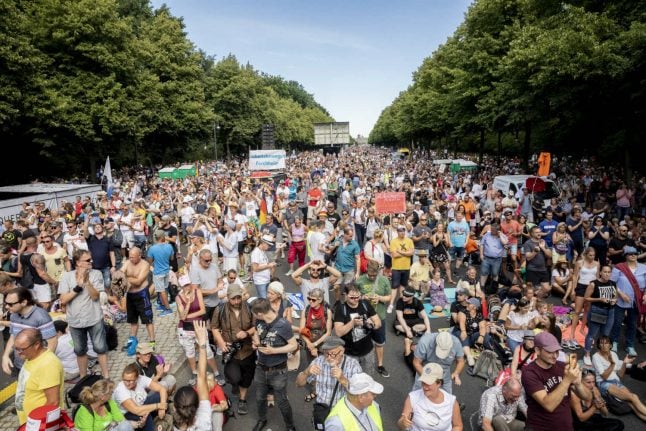Dozens of police were injured, with three hospitalised, while dispersing some 20,000 people protesting anti-pandemic measures.
This was the scene in the centre of Berlin on Saturday as people took to the streets without masks and disregarding safey measures while chanting: “We are the second wave”.
The demo has caused major concern in Germany which is currently seeing a spike in confirmed coronavirus infections.
As of Monday there were a total, of 209,893 Covid-19 cases and 9,141 deaths reported to the Robert Koch Institute. Recently there have been around 900 new infections per day – the highest level since May.
READ ALSO: Berlin protest against coronavirus measures draws 20,000
The move has sparked cross-party calls for a crackdown on protests.
Armin Schuster, of Angela Merkel's centre-right Christian Democrats (CDU) warned against demonstrations where rules are ignored and described them as “a danger to the general public”.
It would be proportionate to allow these kinds of meetings “only under much stricter conditions or not at all”, Schuster told the newspaper Rheinische Post.
In Germany, demonstrations do not have to be approved in principle, but have to be registered. However, during the height of the virus epidemic in March and April, federal states banned larger gatherings and gradually eased these restrictions.
The openly displayed non-compliance with coronavirus rules, attacks on media representatives, and repeated unpeaceful clashes with the police justified a “much more consistent approach by the authorities,” said Schuster.
Police tweeted they had launched legal proceedings against organisers for not respecting virus hygiene rules. A handful of people held a counter demonstration.
Chancellor Angela Merkel's spokeswoman Ulrike Demmer said that protesters who failed to wear masks or respect social distancing rules had “exploited their right to demonstrate” and were “in no way justified”.
While the freedom to demonstrate was “important”, the “images we saw this weekend were unacceptable”, said Demmer.
She said the government condemned “not only the massive violations against hygiene regulations and basic protective measures”, but also reported attempts to hinder journalists from reporting and attacks on police.
Police said that some 45 officers were injured at the “day of freedom” and other demonstrations.
On social media people tweeted about their shock over the demo.
A day after Germany sees its highest number of new daily infections since mid-May, 17,000 protesters from around the country take to Berlin's streets to protest against the lockdown measures. Without masks, or social distancing. Literally asking to become COVID carriers.
— Musa Okwonga (@Okwonga) August 2, 2020
Fears over new hotspots
Helmut Dedy, Managing Director of the German Association of Cities and Towns, also slammed the event.
Athough the right to demonstrate is a valuable asset, Dedy told Germany's Funke media group, “new corona hotspots must not develop from demonstrations. It is irresponsible not to adhere to the rules and regulations in such a confined space,” he said.
Dedy said fines should be imposed if rules are broken during demos.
“And we need to think about how to ensure that misconduct by demonstrators on the scale of what happened at the weekend is not repeated,” he said.
Berlin's governing mayor Michael Müller of the centre-left Social Democrats (SPD), sharply criticised the participants of the large-scale demonstration.
Müller told broadcaster RBB's Abendschau that he was extremely annoyed that people from other parts of Germany came to Berlin to exercise their right to demonstrate while disregarding safety rules.
Within the SPD, however, opinions differ on the police's strategy: federal Justice Minister Christine Lambrecht praised the fact that the police had “consistently taken action”.
“I have no sympathy for demonstrators who high-handedly ignore this”, Lambrecht told the Süddeutsche Zeitung.
SPD co-leader Saskia Esken questioned the deployment strategy of police. “The demonstration could have been broken up earlier,” she told ARD's Tagesschau.
'I can see no wrongdoing'
Yet some people defended the demo.
“I can see no wrongdoing,” Tino Chrupalla, of the far-right Alternative for Germany (AfD) told broadcaster ARD. He said the demo had been peaceful and people had taken to the streets for their basic and civil rights. “And that can only be welcomed,” he said.
Chief executive officer of the Association of Towns and Municipalities, Gerd Landsberg, said in a live online broadcast for Bild newspaper on Sunday that he didn't understand why the Berlin government hadn't issued stricter rules for the demo.
However, he said he understood why people could become impatient in the face of restrictions.
“It's a marathon run – and it's hard to maintain discipline there,” he said.
Bundestag Vice President Wolfgang Kubicki, of the pro-business Free Democrats, showed understanding for the protesters during the live Bild online broadcast.
He said he felt sure among the demonstrators that there were a lot of people “who are simply desperate because they no longer know why these measures are being implemented”, said the FDP vice-president.
“Politicians have failed to explain to people exactly what the aim of all these measures actually is,” he added.
With reporting from AFP.



 Please whitelist us to continue reading.
Please whitelist us to continue reading.
Member comments